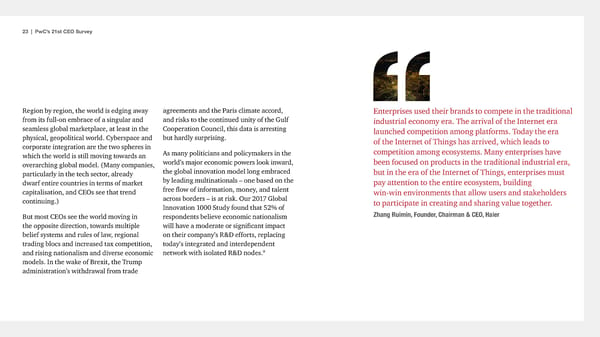23 | PwC’s 21st CEO Survey Region by region, the world is edging away agreements and the Paris climate accord, Enterprises used their brands to compete in the traditional from its full-on embrace of a singular and and risks to the continued unity of the Gulf industrial economy era. The arrival of the Internet era seamless global marketplace, at least in the Cooperation Council, this data is arresting launched competition among platforms. Today the era physical, geopolitical world. Cyberspace and but hardly surprising. of the Internet of Things has arrived, which leads to corporate integration are the two spheres in competition among ecosystems. Many enterprises have which the world is still moving towards an As many politicians and policymakers in the overarching global model. (Many companies, world’s major economic powers look inward, been focused on products in the traditional industrial era, particularly in the tech sector, already the global innovation model long embraced but in the era of the Internet of Things, enterprises must dwarf entire countries in terms of market by leading multinationals – one based on the pay attention to the entire ecosystem, building capitalisation, and CEOs see that trend free flow of information, money, and talent win-win environments that allow users and stakeholders continuing.) across borders – is at risk. Our 2017 Global to participate in creating and sharing value together. Innovation 1000 Study found that 52% of But most CEOs see the world moving in respondents believe economic nationalism —han‘ ˜–imin ™o–n†er hairman ” E šaier the opposite direction, towards multiple will have a moderate or significant impact belief systems and rules of law, regional on their company’s R&D efforts, replacing trading blocs and increased tax competition, today’s integrated and interdependent and rising nationalism and diverse economic network with isolated R&D nodes.9 models. In the wake of Brexit, the Trump administration’s withdrawal from trade
 21st CEO Survey - The Anxious Optimist in the Corner Office Page 22 Page 24
21st CEO Survey - The Anxious Optimist in the Corner Office Page 22 Page 24